C++ Programming Essentials
Build powerful programs and boost your problem-solving skills with our comprehensive C++ programming course. This hands-on C++ programming language course is perfect for beginners and professionals looking to learn C++ and dive deep into object-oriented programming.
Level : Intermediate
Duration :90 hrs
Rating : 4.9/5
Language : C++
Activate this Course for :
₹ 3999
3999
Activate this Course for :
₹ 4999
4999
Enter Details
C++ Programming Essentials Course Overview
Understand core concepts of the C++ programming language
Learn syntax, control structures, functions, arrays, pointers, and memory management
Dive deep into classes, objects, inheritance, polymorphism, and encapsulation
Practice with real-world coding challenges and capstone projects
Earn a certificate upon completing this industry-relevant c plus plus course
C++ Programming Essentials Course Includes
Certification After completing the courses
We Provides 24/7 Dedicated Forum Support
Accessing to AI tools to enhance coding skills
C++ Programming Essentials Course Contents
-
1.1.History of C++
-
1.2.Structure of a program
-
1.3.Compiling and running
-
1.4.C++ vs C features
-
1.1.History of C++
-
1.2.Structure of a program
-
1.3.Compiling and running
-
1.4.C++ vs C features
-
2.1.Primitive types, modifiers
-
2.2.Variable declarations
-
2.3.Type conversions
-
2.1.Primitive types, modifiers
-
2.2.Variable declarations
-
2.3.Type conversions
-
3.1.Arithmetic, relational, logical, assignment
-
3.2.Bitwise, compound, increment/decrement
-
3.1.Arithmetic, relational, logical, assignment
-
3.2.Bitwise, compound, increment/decrement
-
4.1.Conditional statements: if, if-else, switch
-
4.2.Loops: for, while, do-while
-
4.3.Break and continue
-
4.1.Conditional statements: if, if-else, switch
-
4.2.Loops: for, while, do-while
-
4.3.Break and continue
-
5.1.Function declaration/definition
-
5.2.Function overloading
-
5.3.Scope rules, recursion
-
5.1.Function declaration/definition
-
5.2.Function overloading
-
5.3.Scope rules, recursion
-
6.1.1D and 2D arrays
-
6.2.Passing arrays to functions
-
6.3.Multidimensional arrays
-
6.1.1D and 2D arrays
-
6.2.Passing arrays to functions
-
6.3.Multidimensional arrays
-
7.1.C-style strings vs string class
-
7.2.Common string operations
-
7.3.String manipulation
-
7.1.C-style strings vs string class
-
7.2.Common string operations
-
7.3.String manipulation
-
8.1.Pointers basics
-
8.2.References vs pointers
-
8.3.Dynamic allocation using new/delete
-
8.1.Pointers basics
-
8.2.References vs pointers
-
8.3.Dynamic allocation using new/delete
-
9.1.Class declaration and definition
-
9.2.Access specifiers
-
9.3.Creating and using objects
-
9.1.Class declaration and definition
-
9.2.Access specifiers
-
9.3.Creating and using objects
-
10.1.Default, parameterized, copy constructors
-
10.2.Destructor behavior
-
10.1.Default, parameterized, copy constructors
-
10.2.Destructor behavior
-
11.1.Getter and setter methods
-
11.2.Use of private members
-
11.1.Getter and setter methods
-
11.2.Use of private members
-
12.1.Single, multiple, multilevel inheritance
-
12.2.Constructor chaining
-
12.3.Access control in inheritance
-
12.1.Single, multiple, multilevel inheritance
-
12.2.Constructor chaining
-
12.3.Access control in inheritance
-
13.1.Function overriding
-
13.2.Virtual functions and vtables
-
13.3.Pure virtual functions and abstract classes
-
13.1.Function overriding
-
13.2.Virtual functions and vtables
-
13.3.Pure virtual functions and abstract classes
-
14.1.Unary and binary operator overloading
-
14.2.Friend functions
-
14.3.Restrictions on overloading
-
14.1.Unary and binary operator overloading
-
14.2.Friend functions
-
14.3.Restrictions on overloading
-
15.1.Function templates
-
15.2.Class templates
-
15.3.Template specialization
-
15.1.Function templates
-
15.2.Class templates
-
15.3.Template specialization
-
16.1.Using fstream
-
16.2.Reading and writing files
-
16.3.Binary vs text modes
-
16.1.Using fstream
-
16.2.Reading and writing files
-
16.3.Binary vs text modes
-
17.1.Try, catch, throw syntax
-
17.2.Standard exception classes
-
17.3.Custom exceptions
-
17.1.Try, catch, throw syntax
-
17.2.Standard exception classes
-
17.3.Custom exceptions
-
18.1.Vectors, Lists, Stacks, Queues
-
18.2.Maps, Sets
-
18.3.Iterators and algorithms
-
18.1.Vectors, Lists, Stacks, Queues
-
18.2.Maps, Sets
-
18.3.Iterators and algorithms
-
19.1.Designing an OOP-based project
-
19.2.Code review and documentation
-
19.3.Presentation and evaluation
-
19.1.Designing an OOP-based project
-
19.2.Code review and documentation
-
19.3.Presentation and evaluation
Benefits
Our Dashboard offers 1500+ coding problems to sharpen skills and prepare for company-specific interviews. Track progress, build your profile, and boost job-readiness for successful technical interviews
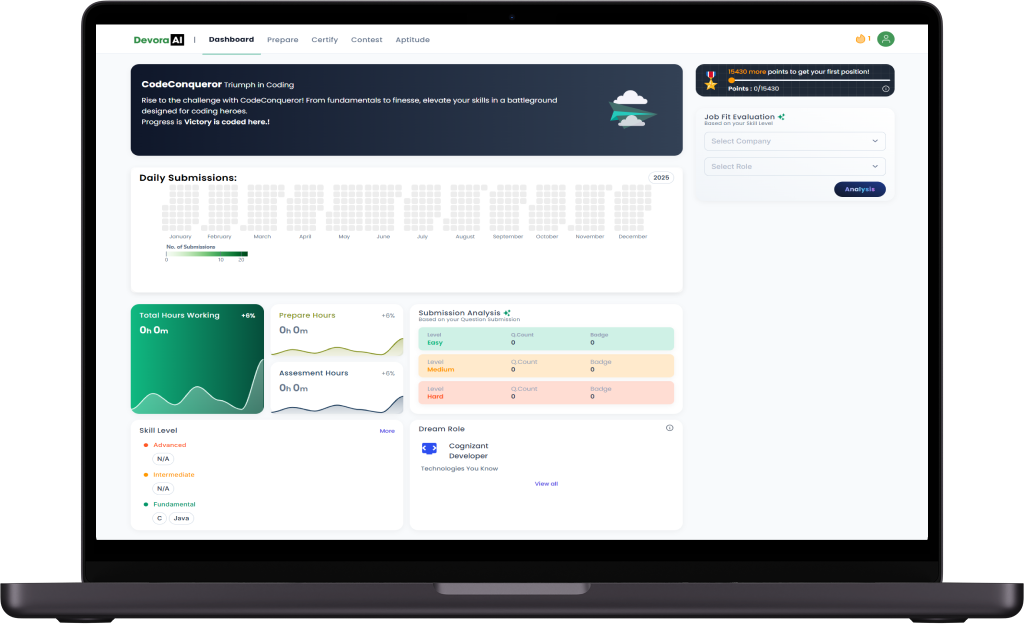
Our product provides real-time debugging assistance, allowing learners to efficiently identify and fix errors, enhancing their programming skills and understanding
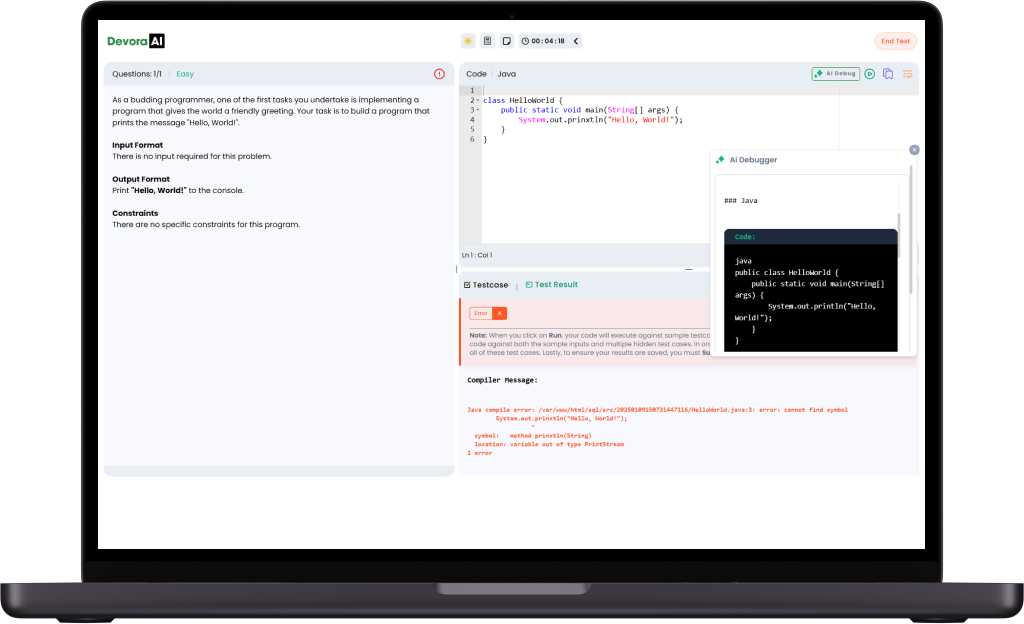
Our integrated IDE compiler offers a unified platform for writing, executing, and debugging code efficiently. With real-time execution and instant feedback, users can test and optimize their code seamlessly.
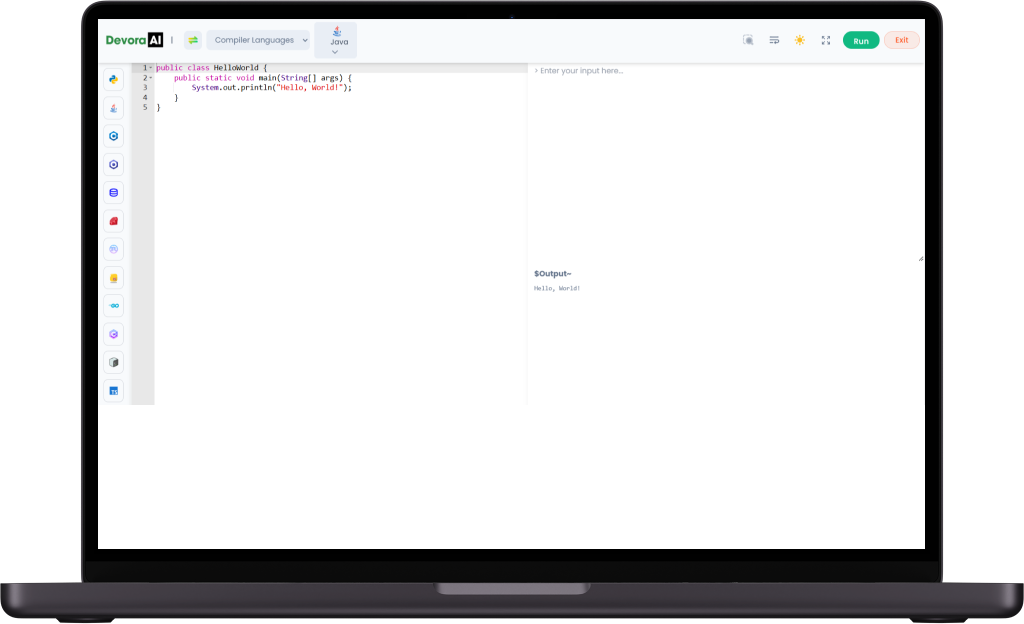
we organize coding contests within the platform, offering users the opportunity to compete against peers, test their problem-solving abilities, and enhance their skills through time-bound challenges and real-world scenarios
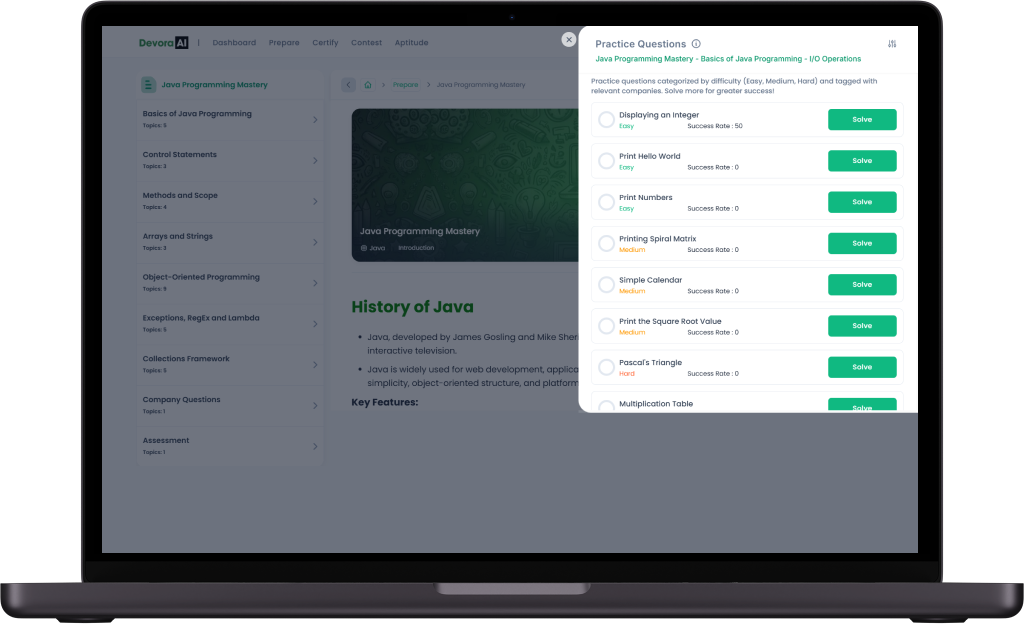
We maintain a personalized profile for each user, tracking their learning progress, performance in coding problems, and achievements,It also includes a record of completed contests, certifications earned, and coding skills developed etc
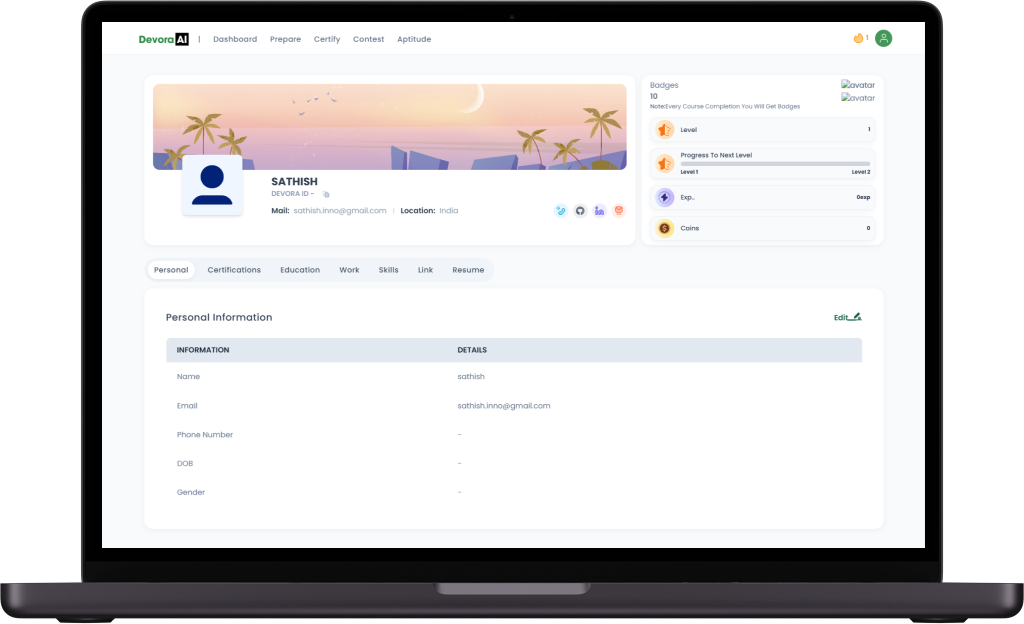
This is one For You
Hands on training
Looking to enhance your Coding skills
Innovation Ideas
lets you create innovative solutions, explore technologies
Newbie Programmer
Budding Programmer , Wants to learn some tricks and tips
Upskilling your skills
A professional wanting to Update their skills
Gain a Competitive Edge With Our Professional Certificates

Master the latest programming languages and enhance your skill set with a recognized certificate.
unlock new career opportunities with a programming certificate


